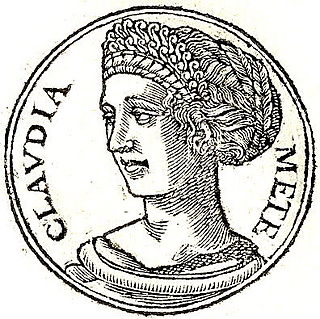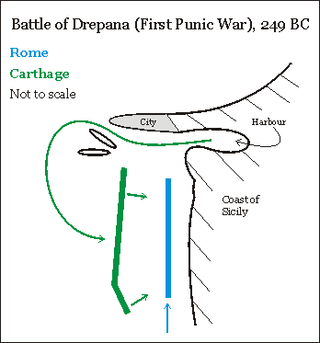Related Research Articles
Year 249 BC was a year of the pre-Julian Roman calendar. At the time it was known as the Year of the Consulship of Pulcher and Pullus. The denomination 249 BC for this year has been used since the early medieval period, when the Anno Domini calendar era became the prevalent method in Europe for naming years.

Clodia, nicknamed Quadrantaria, Nola, Medea Palatina by Cicero, and occasionally referred to in scholarship as Clodia Metelli, was one of three known daughters of the ancient Roman patrician Appius Claudius Pulcher.

The gens Claudia, sometimes written Clodia, was one of the most prominent patrician houses at ancient Rome. The gens traced its origin to the earliest days of the Roman Republic. The first of the Claudii to obtain the consulship was Appius Claudius Sabinus Regillensis, in 495 BC, and from that time its members frequently held the highest offices of the state, both under the Republic and in imperial times.

Adherbal, also known as Atarbas, was the admiral of the Carthaginian fleet which battled the Romans for domination of the Mediterranean Sea during the First Punic War. Polybius identified Adherbal during the Battle of Drepana as the Carthaginian commander-in-chief. He led the Carthaginian fleet to Drepana in Sicily and inflicted a crushing defeat on the Roman consul P. Claudius Pulcher during the naval battle in 249 BC.
The naval Battle of Drepana took place in 249 BC during the First Punic War near Drepana in western Sicily, between a Carthaginian fleet under Adherbal and a Roman fleet commanded by Publius Claudius Pulcher.
Appius Claudius Pulcher was a Roman general and politician of the 3rd century BC, active in the Second Punic War.
Appius Claudius Pulcher was a Roman politician of the 2nd century BC.
Appius Claudius Pulcher was a Roman noble, general and politician of the 1st century BC. He was the father of a number of renowned Romans, most notable: the infamous Clodius and Clodia.
Appius Claudius Pulcher was a Roman patrician, politician and general in the first century BC. He was consul of the Roman Republic in 54 BC. He was an expert in Roman law and antiquities, especially the esoteric lore of the augural college of which he was a controversial member. He was head of the senior line of the most powerful family of the patrician Claudii. The Claudii were one of the five leading families which had dominated Roman social and political life from the earliest years of the republic. He is best known as the recipient of 13 of the extant letters in Cicero's ad Familiares corpus, which date from 53 to 50 BC. They do not include any of Appius' replies to Cicero. He is also well known for being the older brother of the infamous Clodius and Clodia.
Marcus Livius Drusus Claudianus was a senator and praetor of the Roman Republic. He was born with the name Appius Claudius Pulcher, into the patrician family of the Claudii Pulchri but adopted by a Livii Drusi as a small child. His daughter Livia Drusilla became the wife of the first Roman Emperor Augustus, and he was a direct ancestor of the Julio-Claudian emperors Tiberius, Caligula, Claudius and Nero.

Gaius Claudius Nero was a Roman general active during the Second Punic War against the invading Carthaginian force, led by Hannibal Barca. During a military career that began as legate in 214 BC, he was praetor in 212 BC, propraetor in 211 BC during the siege of Capua, before being sent to Spain that same year. He became consul in 207 BC.
Carthalo was an officer in Hannibal's army during the Second Punic War.
The gens Pinaria was one of the most ancient patrician families at Rome. According to tradition, the gens originated long before the founding of the city. The Pinarii are mentioned under the kings, and members of this gens attained the highest offices of the Roman state soon after the establishment of the Republic, beginning with Publius Pinarius Mamercinus Rufus, consul in 489 BC.
Publius Claudius Pulcher was a son of Publius Clodius Pulcher and his wife Fulvia. He was briefly the brother-in-law of Octavian through Octavian's marriage to his sister Claudia.
Lucius Junius Pullus was a politician and general of the Roman Republic. He was consul in 249 BCE together with Publius Claudius Pulcher. He and his consular colleague fought in the ongoing First Punic War.
Marcus Claudius Glicia or Glycias was a subordinate of the consul Publius Claudius Pulcher who briefly served as dictator in 249 BC.
The naval Battle of Phintias took place in 249 BC during the First Punic War near modern Licata, southern Sicily between the fleets of Carthage under Carthalo and the Roman Republic under Lucius Junius Pullus. The Carthaginian fleet had intercepted the Roman Fleet off Phintias, and had forced it to seek shelter. Carthalo, who heeded the warning of his pilots about impending storms, retired to the east to avoid the coming weather. The Roman fleet did not take any precautions and subsequently was destroyed with the loss of all but two ships. The Carthaginians exploited their victory by raiding the coasts of Roman Italy until 243 BC. The Romans did not mount a major naval effort until 242 BC.
Appius Claudius Russus was Roman consul in 268 BC. He triumphed over the Picentes, but died in office.
Gaius Fundanius Fundulus was a Roman politician of gens Fundania in the third century BC.
References
- 1 2 Archive, History. "People | Publius Claudius Pulcher". History Archive. Retrieved 29 August 2024.
- ↑ Goldsworthy, The Fall of Carthage, p. 122.
- ↑ "The Sacred Chickens | Irene Soldatos" . Retrieved 29 August 2024.
- ↑ "The First Punic War: Audacity and Hubris" . Retrieved 28 August 2024.
- ↑ "Suetonius: Tiberius".
- ↑ Cicero, M. Tullius. De natura deorum. Perseus Digital Library. p. 2.7. Retrieved 17 February 2016.
- ↑ Williams, Tara Layman (2011). The Complete Guide to Raising Chickens: Everything You Need to Know Explained Simply. Atlantic Publishing Company. ISBN 978-1-60138-374-7.
- ↑ thehistorianshut (14 September 2018). "The Disgraced Ancient Roman Admiral Who Did Not Heed The Sacred Chickens During The First Punic War". The Historian's Hut. Retrieved 29 August 2024.
- ↑ Archived at Ghostarchive and the Wayback Machine : Law & Order in Ancient Rome - The Case of the Sacred Chicken Killer. YouTube .
- ↑ Dillon, Matthew; Garland, Lynda (28 October 2013). Ancient Rome: A Sourcebook. Routledge. ISBN 978-1-136-76143-0.